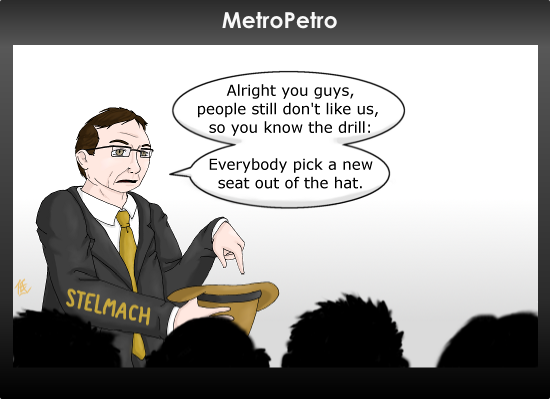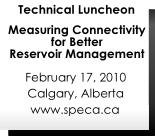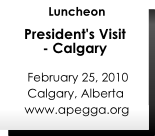| can't see the pictures? view it in your browser here. | ||||||||||||||||||||||||
|
||||||||||||||||||||||||
 Using public pressure data without correcting it can severely reduce your reserves. Unsuspecting reservoir engineers use the ERCB’s pressure data base trusting that it has been corrected properly. Proven has seen poor pressure data result in decisions that pools are discontinuous and too small to develop. Proven has also seen these errors result in low material balance reserve estimates drastically affecting company’s net asset value. Perhaps the most important information from a pressure test is the representative average reservoir pressure corrected to datum. This is the pressure needed for P/Z plots or material balance. Unfortunately this reported reservoir datum pressure is rarely correct for three reasons: Apathy, Inexperience, and Cost Cutting. Apathy reduces accuracy. Most pressure tests are taken to merely satisfy regulatory requirements and not to understand the reservoir performance. Well tests are not planned or programmed and the results not valued. The resulting data is poor. Inexperience reduces accuracy. Since submission and correction of pressure tests is tedious and inglorious work, it is usually relegated to the least expensive and least trained person on the oil company’s team. This person often doesn’t understand the physical significance and eventual use of the datum corrected pressure and therefore does it incorrectly. Cost cutting reduces accuracy. There are some fairly easy ways to get around the automated PAS checks. Many oil companies have found wire-line companies or gauge contractors that can submit their PAS files for them without analysis for free and get past the checks. The cost of the wire-line job or gauge rental includes this quick submission. Minimal or no analysis or correction of the pressure data to datum is attempted. PAS or Pressure ASCII Standard is the format that Alberta’s ERCB uses to receive and store pressure test and fluid composition information. Upon electronic DDS submission, a PAS file is checked automatically for the existence of all the information required by the ERCB. For example, PAS files are checked for the existence of final fluid gradient and final pressure. Some automated quality checks are also performed on this data. Whenever reservoir engineers actually try to use the pressure data collected by the ERCB and reported by Geoscout or Accumap, the pressures are incorrect. Each pressure must often be analysed again every time it is used. Rather than analyzing the pressure test right the first time for a reasonable cost, it is analyzed several times later in a pool’s life. The cost of analysis is multiplied. ~Granger J. Low |
|
|
 $43.3 Billion – the combined market capital of Suncor upon acquiring Petro-Canada $73.97 – the price of petroleum per barrel $5.39 – the price of natural gas per thousand BTUs $13.26 Billion – Suncor debt 1 – Canadian oil and gas companies larger than Suncor 17 – the number of days the Vancouver 2010 Olympics will last $4.3 Billion – the projected size of Alberta’s current provincial deficit 13 – the number of Conservative provincial cabinet ministers changed during Premier Stelmach’s recent cabinet shuffle $29 – the approximate average price per 100g of tea in China (or so it is said) |


Beginning in January, Proven Reserves has launched a revised HTML format of its newsletter. Known for several years as Reservoir Engineering TIPS, the monthly exposition of industry engineering news and technical pointers has been renamed to Proven Best Practices. The transition to a more dynamic HTML format ensures that Proven Best Practices is delivered to each subscriber fully optimized for a smaller footprint and a more streamlined experience. Proven Best Practices (PBP for short) will continue to be published and delivered directly to you monthly. We are always interested in the opinions of our readers, and if you would like to let us know what think of our new format, or have questions regarding any of our material, please drop us a line at info@proven-reserves.com. |
|
|
|








